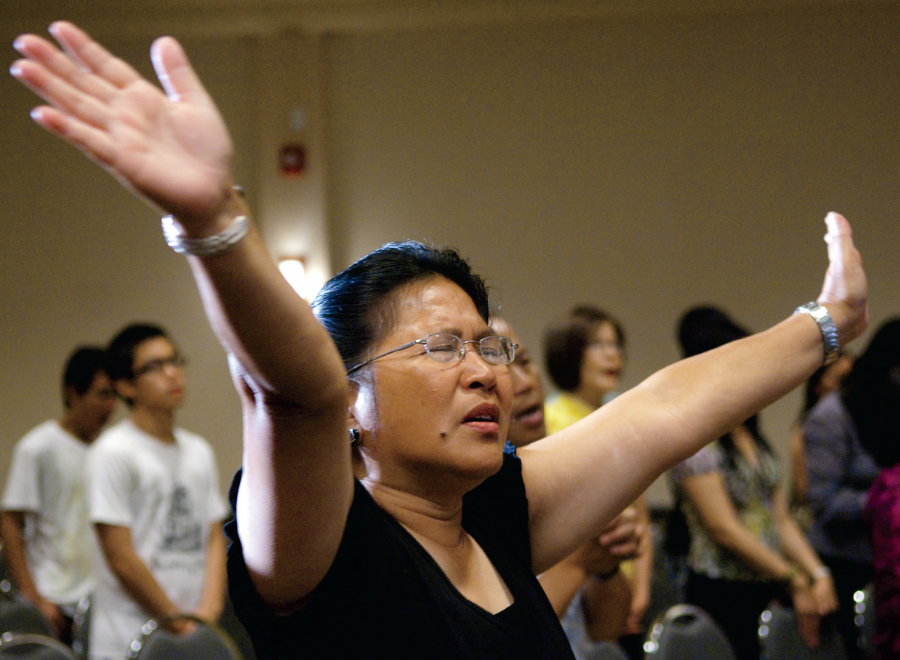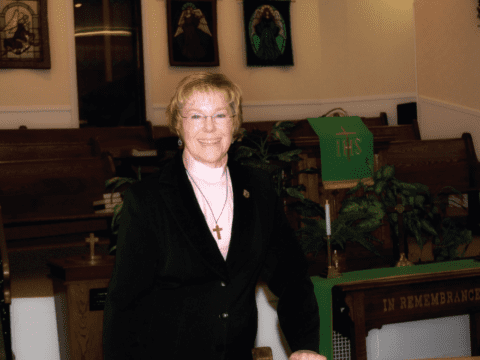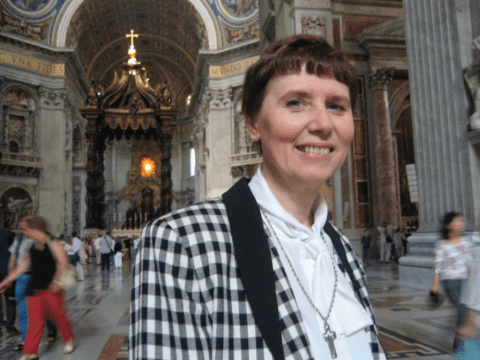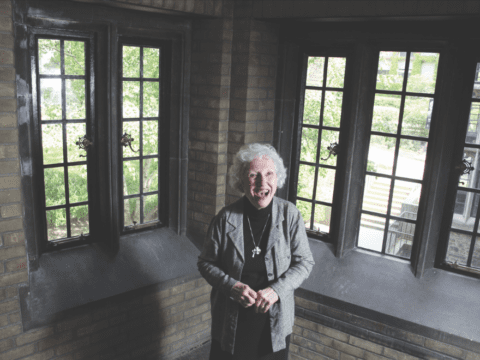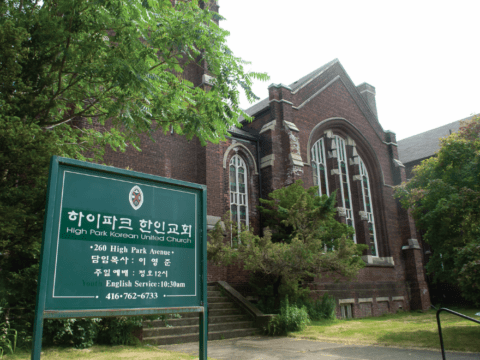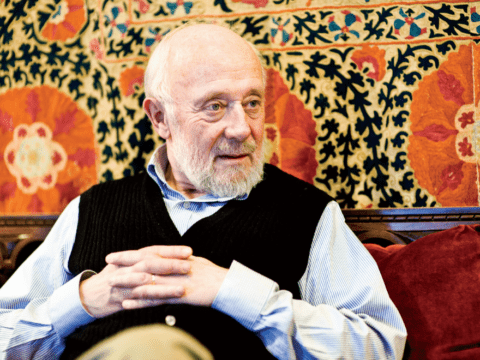In a dimly lit conference room inside a college dormitory, the members of Greenhills Christian Fellowship in Toronto gather for Sunday worship. Kids play tag while adults help themselves to their morning coffee. And since most of the church’s approximately 150 members are newcomers to Canada from the Philippines, sweet Filipino bread rolls are served, too.
Outside, on Progress Avenue, traffic rushes past the church and along the noisy throughway lined with chain hotels, high-rise apartments and industrial lots. It’s hardly a traditional setting for a church. But about half a dozen congregations are based in this suburban neighbourhood.
“Today, we will worship the Lord in mind and spirit, yes?” shouts the Greenhills worship leader into a microphone when it’s time to begin. “Yes!” says the congregation. An “Amen!” bursts from a few people already seated in the back row.
A four-piece band flies into a pop-rock version of All Creatures of Our God and King, and the worshippers sing. One woman with an ecstatic face reaches heavenward with her fingertips. The sermon this Sunday is about heaven. “It is a real place, and it’s our future. Are you excited to go to heaven?” asks Pastor Narry Santos. “Yes!” the people shout.
Churches like Greenhills may be the future of Christianity in Canada, according to some social scientists. The congregation’s spirited style of worship, concrete interpretation of the Bible and strong sense of community mark what American historian Philip Jenkins calls “Christianity’s new centre of gravity”: the churches of the Global South. In his 2002 best-seller The Next Christendom, Jenkins argues that Christians from Africa, Asia and Latin America are gaining influence to match their growing numbers and that they will eventually steer the course of Christianity as a whole.
As Christians from abroad establish themselves in Canada, mainline denominations such as The United Church of Canada are left to figure out how or if they will adapt to the changing demographics around them. Will adapting to newcomers provide a jolt of new life? Will newcomers even pay attention? One thing is certain: newcomers will change the Canadian religious landscape as a whole.
Since it was founded three years ago, Greenhills Christian Fellowship in Toronto has already planted two satellite churches. And each of those two churches is planning to plant two more. “The church is multiplying itself,” says Santos. “We are overwhelmed by God’s work through us.”
Most of Greenhills’ new members come from the Filipino community, Canada’s third-largest immigrant group and its largest predominantly Christian one. Whenever a family known to any of Greenhills’ existing members moves to Canada, someone welcomes them at the airport and helps them with the details of getting settled: obtaining a social insurance number, finding an affordable grocery store and so on. “Imagine going to a new place,” says Joseph Cachola, the chair of Greenhills’ Canadian board. “You don’t know anybody, and you don’t know what to do. If you have a church family, it helps you to adjust.”
In the last 10 years, between 2.2- and 2.6-million new citizens and permanent residents have settled in Canada. It is not yet known how many of these immigrants are Christian, but data from Statistics Canada show that Christians made up almost half of the immigrants who arrived in the previous period, between 1996 and 2001. This influx has dramatic implications for the demographics of Christianity throughout Canada. While many older, established denominations are losing membership, new churches are exploding, especially in the cities with the most immigrants: Vancouver, Montreal and the Greater Toronto Area.
On a worldwide level, a similar shakeup is taking place. Christianity is gaining steady ground in the Global South, especially in Africa, as the movements once started by Western missionaries take on a life of their own. “Between 1900 and 2000, the number of Christians in Africa grew from 10 million to 360 million, from 10 percent of the population to 46 percent,” writes Jenkins. “If that is not the largest religious change in human history in such a short period, I am at a loss to think of a rival.” During the same time period, Christianity has declined so much in Europe and North America that the Vatican just set up a new department to“re-evangelize” the West.
According to Todd M. Johnson, a religious demographics researcher for Encyclopaedia Britannica, we’ve finally reached the point where Europeans and their North American descendants are in the minority of Christians. But the United Church’s membership does not reflect this change, at least not yet.
At a coffee shop in downtown Toronto, Rev. Michael Blair, the executive minister in charge of the United Church’s intercultural and diverse ministries, counts ethnic congregations. There are about 50 of them among the more than 3,300 congregations that make up the denomination.
Many of these congregations have a long history with the United Church. For example, Chown Memorial and Chinese United in Vancouver is an amalgamation of two former Methodist churches, each going back to the 1880s.
Four years ago, the United Church officially committed itself to becoming intercultural. According to Blair, not everyone realized what a radical change that meant. The vision was to move beyond tokenism and polite multiculturalism to something deeper. “It was to make a space where people with ethnocultural identities are involved in the whole of the church, including the leadership,” he says.
Blair— who came to Canada from Jamaica as a teenager and decided to join the United Church because his partner was the minister of Bloor Street United in Toronto— is frank about how he sees the denomination’s relationship to immigrant communities. “We don’t benefit from the global church being here, because we don’t reach out to people unless they come to us first,” he says. “Since the 1970s, there’s been no intentional outreach to any immigrant community in this country.”
He suggests that United Church people might be unsure about reaching out to newcomers because they’re afraid of being paternalistic like their forebears, some of whom took part in harmful mission projects like the residential school system. “But I’m not talking about converting people or asking them to be what they’re not,” he says, adding that a good place to start might be with Methodist immigrants who may not be aware that the United Church is the face of Methodism in Canada.
Then, glancing down at his coffee, Blair chuckles nervously. “We might also be afraid of reopening closed debates,” he says, referring to the church’s policy of welcoming people of all sexual orientations.
Feet shifted uncomfortably at a Montreal Presbytery meeting in 2002, when the minister conducting the meeting’s worship — the Congolese leader of a congregation that had recently joined the United Church — started into a fiery sermon against gays and lesbians.
Fred Braman, the secretary of Montreal Presbytery at the time, felt himself sweating as he translated the sermon live from French to English. “I had to translate faithfully, even though I didn’t really want to repeat those things,” he says.
Eventually, three-quarters of the Presbytery members listening got up and left. “And at the end of the worship, many other ministers made a point of distancing themselves from what he had said,” says Braman. The African congregation officially separated from the United Church soon afterward in disagreement over the Montreal Presbytery’s stand in favour of same-sex marriage.
This incident was an example of a truth that can’t be glossed over: there are fundamental differences in values and theology between United churches and many churches of Africa, Asia and Latin America. There are, of course, exceptions to this rule, but southern churches tend to interpret the Bible more literally than their northern counterparts. The result is that topics such as homosexuality and the role of women can become points of contention.
The concrete existence of evil beings is another one. “To read the Gospels is to make the intimate acquaintance of demons and demonic forces,” says Jenkins. “Overwhelmingly, global South churches teach a firm belief in the existence of evil and in the reality of the devil, and that is especially true of Pentecostal and charismatic churches.” Northern churches, on the other hand, tend to feel uncomfortable with literal interpretations of the demons who appear in the Bible.
“We have to decide what our negotiables are and what our non-negotiables are,” says Blair, who believes that including women, gays and lesbians in the leadership of the church should be non-negotiable.
Other leaders in the United Church have additional ideas about what can or can’t be negotiated. For instance, the church might like to expand its repertoire of worship styles to include so-called Pentecostal or experiential worship, according to Rev. Connie denBok, a United Church minister who has planted two intercultural ecumenical churches. “Most United Church folk of European descent don’t raise their arms in the air or shout encouragement to the preacher during the sermon,” she says. “Should we expect this new generation of churchgoers to stand still and remain silent before we consider them ‘really United Church’? It’s about letting people be culturally authentic in worship. Many recent Canadians are the spiritual descendants of our own missionaries. We should welcome them and relinquish some control.”
Immigrant church leaders have their own visions for the future. While many of them don’t picture themselves joining established denominations like the United Church, some do. It would give them access to financial support, which is often badly needed by newer churches. It would also give them the opportunity to take part in wider church projects, such as the work of the Mission and Service Fund.
Rev. Emmanuel Ofori decided to apply for admission to the United Church in 2003 and wanted to bring his congregation along with him. Ghana Calvary Methodist United, as it is now called, is a lively United Church congregation in the west end of Toronto known for Sunday services that feature drumming and hymns imported from Ghana. “When you go to worship there, you don’t need to work out that week,” jokes Ofori.
After Ofori approached the United Church, he was sent through a marathon of courses and interviews. The process was akin to becoming a minister for the first time, he says. “Personally, I found that a bit disturbing because I was already ordained in a recognized church. But I went through with it because I was really motivated.”
Ofori’s experience of taking his required courses at Emmanuel Collegein Toronto was one of culture shock. It ranged from small things like having no idea why his classmates all found hockey so exciting, to more troubling experiences like having one of his papers — he doesn’t want to reveal what it was about— rejected by a professor for being “wrong.”
This past year, Ofori worked on a task force that recommended the United Church’s admission requirements change to be more accommodating of ordained ministers from other denominations. He is happy with the progress but feels there is still more the United Church could do to make it easier for immigrant leaders and their congregations to join the denomination and feel a sense of belonging. “The courses are good. They help the person to understand the United Church,” he says. “But I think they should be taught through a more intercultural lens. That’s an idea that’s very close to my heart.”
Blair is afraid that the United Church’s admission process is still too cumbersome and that immigrant leaders will get frustrated and take their ministry elsewhere. “And without leaders with the cultural capacities to reach out to people from other communities, those people will not feel welcome,” he says.
On the other hand, the United Church should be discerning and keep in mind that not everyone is a good fit, says Fred Braman, the former Montreal Presbytery secretary who spent a good part of his time trying to settle differences with the Congolese minister who eventually left the United Church over his stance toward gays and lesbians. “Some congregations need their own home,” he says.
Old car parts littered the lawn outside the small hall where Living Word Community Church used to worship in Brampton, Ont. A young multicultural congregation led by Jamaican-Canadian pastor Rev. Arnold Ainsley, Living Word could not yet afford its own property. To make matters worse, the City of Brampton at the time had restrictive zoning regulations for places of worship.
With its options and finances limited, Living Word had moved between several different meeting places already, including school classrooms and a hotel conference room. But the lot tucked in among the truck dealerships and autobody shops along Rutherford Road was the worst place yet. “Part of where the church met used to be a washroom,” remembers Ainsley. “There was a car wash next door, and the fumes from it gave people headaches.”
Thanks to the advocacy of a coalition of local faith groups, Brampton updated its bylaws in 2010, allowing places of worship to exist in certain light industrial zones. Living Word now meets legally in a business park. But finding real estate remains one of the greatest challenges for new churches in Canada. Along the way, Living Word shared a building with Heart Lake United in Brampton. The two congregations held the occasional joint service. “It was cool, and they liked our music,” says Ainsley, whose church’s services include liturgical dancing and swelling choruses of communal prayer.
Not all congregations have the right chemistry to share a space, Ainsley says, but when it works, it can be a good way for them to get to know each other. Congregations with church buildings usually decide to share space because they need help paying for the upkeep, but helping out newer congregations — including non-United Church ones — should be a consideration, too, according to Blair. “When newcomers come, they need a place that feels and smells like home. But they also need to connect,” he says.
Ainsley is now dreaming of the day when his church has its own building. But he smiles when he thinks back to his days at Heart Lake United. “You know, it’s not often that people speak well of the landlord!” he laughs.
In the common area of a sales pavilion in Brampton, a couple of dozen men and women stand in a circle, hold hands and sing a benediction from Voices United. To one side of them is a communion table with leftover bannock bread from the United Church’s 85th anniversary communion. To the other side are the entrances to a hairdressing school and a chiropractic centre. And up a storey on the mezzanine sits a set of shiny new steel drums.
North Star United is one of the United Church’s intercultural congregations, with members from Trinidad and Tobago, Guyana, New Zealand, Australia, Jamaica and the Philippines. It used to have a Canadian-born contingent, according to parishioner Margaret Samaroo, but they all left to join another United Church congregation that worshipped in a more traditional sanctuary.
“Those of us who stayed thought it was important to sustain a ministry here,” says Samaroo, a small woman with a powerful singing voice. The Springdale area of Brampton is a gateway community for immigrants. Many past members of North Star attended the church for their first few years in Canada, before moving on to new jobs and new neighbourhoods.
The United Church is developing resources for intercultural congregations like North Star United, including hymns, prayers, sermon starters and articles about intercultural understanding. Unlike ethnic ministry congregations, which cater to a particular cultural group, intercultural churches have to mediate among several.
“Culture is an iceberg; you only see the tip,” says Robert Cousins, an expert on intercultural and diaspora ministries who is on faculty at Tyndale seminary in Toronto. Here in Canada, he explains, we’re quite familiar with the surfaces of other cultures: their food, music, dress and so on. But culture extends deeply into people’s perceptions of reality. “It helps us to interpret life and behaviour,” he says. “The same behaviour can have two different meanings in two different cultures.”
Rev. Doug McLeod, now a minister in the United Church, knows this first-hand. Some years ago, when he was a Free Methodist minister, he was called to lead a church in Brampton where there were tensions simmering between Canadian-born and newer members. He remembers that some people from the Caribbean used to arrive for the service 15 to 20 minutes late. Several other members found this disrespectful and complained to him. Having lived in Jamaica as a child, he recognized that the Caribbean parishioners meant no offence: they just didn’t consider tardiness to be as rude as the Canadians did. He explained this to both parties. “You either try to understand each other or you get an ulcer,” he jokes.
People worshipping together in an intercultural congregation can be a beautiful sight, says Rev. Osbourne Murray, North Star United’s minister. But it doesn’t happen magically. Ideally, the leader will have a special skill set based on deep exposure to other cultures. Adaptability, comfort with ambiguity and specific cultural knowledge all come in handy. “The Gospel is eternal,” says Murray. “But as the apostle Paul said, the modus operandi must adapt.”
It’s hard to predict how the global church will change Canadian churches. General Council Office staffers such as Michael Blair would like to take the plunge, with more ethnic congregations, more intercultural congregations and more sharing of space. “We shouldn’t be afraid to invite people into the church who will transform it,” he says. “There are gifts in the new communities that we can benefit from.”
But the extent to which the United Church will work with immigrant communities — and be transformed by them — is not up to Blair. It’s up to the individual congregations who make decisions about hiring ministers, sharing buildings and the like. Many of the churches of the Global South have a strong sense of purpose. With or without established denominations like the United Church, they will blaze a path in Canada.
Back at Greenhills Christian Fellowship, as the Sunday service nears its end, Pastor Santos leads the congregation in a confident prayer. “Direct our paths,” he says. “Bless our work as your word spreads over the globe. Move your church forward.”
***
This story first appeared in The United Church Observer’s October 2010 issue with the title “Global flair.”

